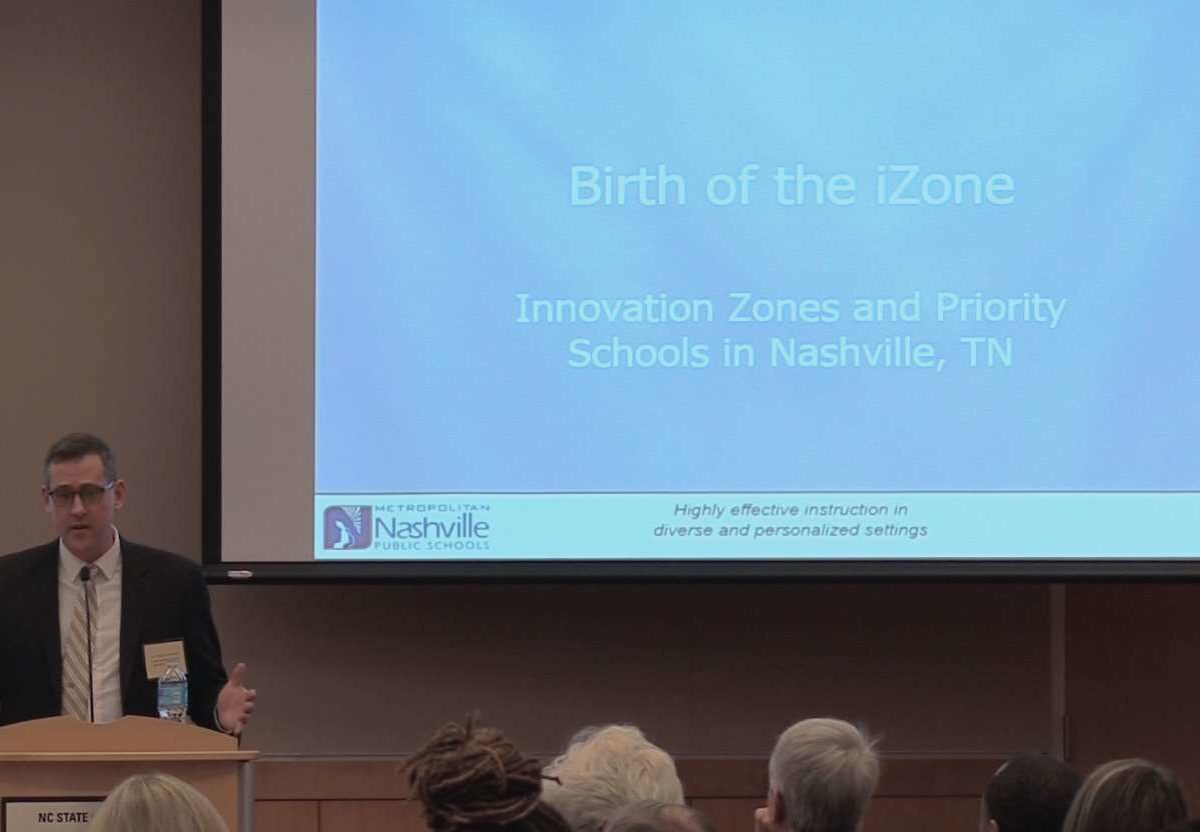

Good relationships between charter and traditional schools can possibly help districts raise the quality of the lowest-performing schools, if results in Nashville, Tennessee are any indication.
That’s what Dr. Alan Coverstone, Metro Nashville Public Schools Innovation Zone Director, is finding during his turnaround work in our neighbor state. But the relationship between charters and traditional schools can be a tense one, he said.
“Pitting one approach against another is dangerous, but also effective,” he said.
The Public School Forum of North Carolina invited Coverstone to the Friday Institute for Educational Innovation in Raleigh Wednesday to discuss a project that gave charter-like flexibility to a group of low-performing schools in Nashville by putting them in an “Innovation Zone.” The Zone was implemented even as Nashville also tried to improve low-performing schools by creating an Achievement School District — similar to the Innovation Zone, except run by charters. Coverstone’s talk was part of the Public School Forum Study Group Committee on Low-Performing Schools.
Coverstone said that the existence of the Achievement School District made the schools entering the Innovation Zone more eager to make it work. The threat of being moved to the Achievement School District and letting charters take over was a powerful motivator, he said. And the two districts were able, when they put their philosophical differences aside, to work together for the benefit of all their students, though Coverstone said that didn’t always happen.
“We were at our worst when we were turning our swords against each other and battling each other,” Coverstone said.
Innovations Zones in Tennessee were created using federal money and began operation in 2012-13. They are able to take in any school in the bottom five percent of the state — just as the Achievement School District can — and put it into the Innovation Zone, aiming to raise it up to become one of the top 25 percent of schools in the state. There were nine schools in the first Nashville Innovation Zone, and they were given some of the same freedoms as charters, including allowing principals more control over budgets, hiring, and program choice.
Schools that enter the Innovation Zone are expected to at least make progress in their first two years or face being moved into the Achievement School District. Coverstone said that all of the schools in Nashville’s first Innovation Zone were able to grow enough to avoid this fate. Over three years, the schools in the Innovation Zone went up about 14.5 points on average for proficiency, but Coverstone said officials had hoped for more.
“We, of course, had much higher ambitions than that,” he said, adding later. “Nevertheless, this is significant growth.
Outside of the Innovation Zone, Coverstone said only 10 of the districts’ roughly 160 schools had faster growth. He also noted that teacher effectiveness levels went up dramatically in the Innovation Zone after the first year.
While the talk at the Friday Institute was focused on the Innovation Zone, Coverstone discussed the importance of collaboration with the Achievement School District and the need for both models if Nashville seriously wanted to turnaround some of its lowest-performing schools.
“At the end of the day, there’s just a lot of work to be done,” he said. “It’s different people who come through those different doors, and it’s only by kind of opening all those doors that at least we thought we could begin to approach the capacity we needed to be successful.”
Coverstone’s presentation was particularly timely given discussions during this past General Assembly session about setting up an Achievement School District in North Carolina.
Rep. Rob Bryan (R-Mecklenburg) was the principle cheerleader for the idea, though it didn’t go anywhere during the long session. Bryan has said that he wants to get a bill passed in the short session this spring, according to the News & Observer. Tennessee’s Achievement School Districts are being watched carefully by officials here as they consider the possibility of bringing the strategy to North Carolina.
The Innovation Zone and Achievement School Districts in Tennessee, and the increasing willingness of legislators to consider such experiments, are all part of a trend nationwide to reexamine how schools can best improve quality. But Coverstone was careful not to necessarily tout the Innovation Zone as the best solution.
“Nothing that I say here suggests that we have it all figured out,” he said.
Below is a video of Dr. Coverstone’s presentation, followed by a Q & A between he and Rep. Graig Meyer, D-Orange.


